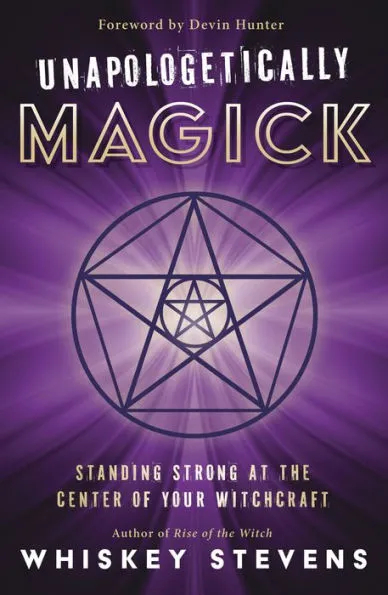Right as I start into Unapologetically Magick, I am struck by author Whiskey Stevens words, "I’ve been struggling with being unapologetically myself in spaces where I fear being judged or misunderstood."
BAM.
Most of my life I have not been obvious about being a witch; no signals from my jewelry, clothing, or conversation gave me away. Even if people knew I was a witch, I was circumspect in my word choice. Mostly this came from a sense of honoring all paths and perspectives, but I must acknowledge the small sense of fear that was also there.
Chapter One invites us to reengage our Inner Child, bringing her out of the closet of Vague Embarrassment. As part of doing that, we consider using the magical energy of each day to guide us, learn about grounding, and consider how we believe in magic.
Chapter Two discusses aspects of typical practices and reminds us that we can be unapologetic yet not have to explain every aspect of our practice. Seemingly non-occult activities, like reading or prayer are powerful ways to engage in our witchcraft. The chapter ends with, "When we are free to find the truth for ourselves, our practice has a stronger and more stable foundation. Your practice is yours, and it does not need to be anyone else’s. To understand this is its own type of freedom and an important step in being unapologetically magick. (p. 37)"
Chapter Three gets a little esoteric even for a book about witchcraft as Stevens discusses alchemy, beginning with information and techniques around our emotions. This section includes a discussion about hexing while angry. We then move on to mental alchemy and an integration of techniques for the whole self. Tarot cards and astrology are used in this chapter's exercises.
Chapter Four is all about tarot, focusing on working with the court cards. While I enjoyed the information Stevens imparts, I felt this was the weakest chapter. It's structure is different from the rest and has the feel of an editorial decision to carve it out of Chapter Three to stand alone.
Chapter Five looks at what the author calls everyday magick and how seemingly mundane activities, like cooking or cleaning, can be magickal when done with intent. Chapter Six continues this idea by discussing how our appearance can be a magickal practice. Clothing, makeup, sigils all create a magickal being, YOU. The last section, "Everything You Do Is Magick," was a brilliant summation and exhortation.
Chapter Seven looks at Magickal Recordkeeping, including tracking our emotions and -- vitally -- what did not work the way we wanted it to. Stevens and I are in complete agreement when we say that you can learn so much more from the magick that doesn't work than when it does. I especially resonated with this statement: "A magickal record allows us the freedom to spill our thoughts onto the page, record our spells, dive into who we are, and begin to truly know ourselves. Magick is power, and power comes from knowing yourself. (p. 131)"
Chapter Eight dives into the power of language -- whether spoken or not -- and how magick is about communication as much as will. Our task is to learn our own language and how it interfaces with the language of energy to manifest our will. Chapter Nine discusses creating a magickal life and Chapter Ten looks at the intertwining connection of technology and magick.
Chapter Eleven encourages the reader to begin (or continue) the process of confronting our programming. The final chapter, Twelve, steps into the realm of Personal Power.
This is an excellent book in many ways and I highly recommend it.
~review by Lisa McSherry
Author: Whiskey Stevens
Llewellyn Publications, 2023
pp. 240, $16.99

